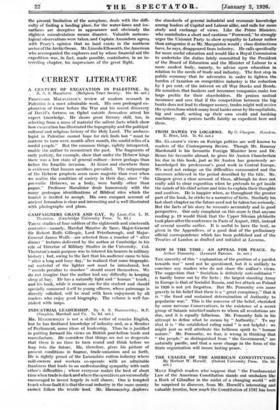INDUSTRIAL LEADERSHIP. By S. S. Hammersley, M.P. (Simpkin, Marshall and
Co. 7s. 6d. net.) Mn. HAMMERSLEY is not a skilful writer of concise English, but he has firsthand knowledge of industry and, as a Member
Of Parliament, some ideas of leadership. Thus he is justified in putting forward his views on British post-bellunt trade and manufacture. He 'considers that things- are not so desperate
that there is no time to turn round and think before we leap into the future. He, therefore, gives his picture of present conditions in finance, trade-unionism and so forth. He is rightly proud of theLancashire cotton industry where
mill-owners and workers co-operate with an admirable frankness that leads to an understanding sympathy with each -other's difficulties ;- where everyone makes the best of short time when trade is slack and where the operatives are successfully
encouraged to invest largely in mill shares. One is tempted to ask whose fault it is that the coal industry in the same county cannot follow the textile - lead. Mr. Hammersley.Aciolores the standards of general industrial and economic knowledge among leaders of Capital and Labour alike, and calls for more study and exchange of views. Like the Prime Minister, who contributes a short and cautious "Foreword," he strongly- urges the Unionist Party to show sympathy to Labour rather than antagonize it as Mr. Maequisten would ; class distinctions- have, he says, disappeared from industry. He calls specifically for more useful education and would like a Royal Commission to undertake the duties lately committed by the President
of the Board of Education and the Minister of Labour to a more modest body, namely, -to advise upon education in relation to the needs of trade and industry, The first step in public economy that he advocates in order to lighten the
burden cf taxation on competitive industry is the reduction by 1 per cent. of the interest on all War Stocks and Bonds: He considers that bankers and insurance companies make too large profits for their shareholders. He praises mutual insurance and sees that if the competition between the big banks does not lead to cheaper money, trades might well revive the system from which many local banks arose by the capitalists, big and small, setting up their own credit and banking machinery. He praises tariffs faintly as expedient here and there.










































 Previous page
Previous page